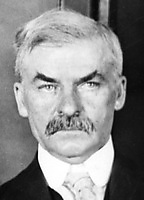|
| Affiliation | Democratic |

|
| |
1924-01-01 |
|
|
| Name | Thomas J. Walsh |
| Address |
Helena, Montana , United States |
| Email | None |
| Website | None |
| Born |
June 12, 1859
|
| Died | March 02, 1933
(73 years)
|
| Contributor | Thomas Walker |
| Last Modifed | Chronicler
Jun 12, 2020 04:21pm |
| Tags |
|
| Info | No Montanan has ever secured the presidential nomination of either major political party, but one came close.
In 1924, Montana Sen. Thomas J. Walsh presided over probably the most divisive, tumultuous convention in the history of the Democratic Party. Torn by such emotional issues as Prohibition and the Ku Klux Klan, delegates took 103 votes to decide on their presidential nominee. By the late balloting, Walsh stood in third place and was gaining ground. After finally choosing political unknown John W. Davis to head the ticket, party leaders begged Walsh to accept the vice presidential nomination. He calmly refused.
By the time of the 1924 Democratic National Convention, Montana's Walsh already had built a distinguished record in the U.S. Senate. In the early 1890s, he migrated to Helena from Dakota Territory where he had practiced law. An Irish Catholic and loyal Democrat, Walsh soon became active in party affairs. He lost in a bid for a U.S. House seat in 1906.
In some ways, this rather dour, focused, serious-minded attorney was an unlikely politician. Walsh's Helena friend, Christopher Connolly, observed that the young lawyer "had no intuitions, only cold, hard logic."
But Walsh was politically astute enough to align himself with Montana's popular progressive movement. As a progressive, Walsh stood as a strong advocate of women's suffrage, prohibition of liquor, unlimited coinage of silver and government regulation of monopolistic businesses.
Yet, after gaining his Senate seat in 1912, he frequently demonstrated a willingness to bend with the political winds, especially around election time. He realized, for example, that he could not stay in office unless he made peace with the leaders of the powerful Anaconda Copper Co. Although he entered the Senate as an avowed isolationist, he eventually became one of the strongest supporters of President Woodrow Wilson's foreign policy and the president's declaration of war against Germany in 1917.
Walsh courted Montana's American Indians, but in the Senate he consistently backed programs that would speed the sale of reservation lands to whites. And Walsh even began to waver in his long-held dry stance on the liquor issue as Prohibition fell increasingly out of favor.
Walsh's most disturbing flip-flop occurred in 1918 when he pressured his young appointee as U.S. attorney in Montana, Burton K. Wheeler, to resign. Wheeler had incurred the wrath of the Anaconda Co. and Montana's super patriots because he refused to prosecute many people charged with speaking out against the war effort under terms of Montana's harsh sedition law. Walsh supported Wheeler only until the furor threatened his own Senate re-election bid.
Years later, Wilson's vice president, Thomas R. Marshall, observed that Walsh "was and is a politician" who stood by his convictions, "but he would have found a way to have stood for them without being immolated upon the altar of his ideals."
Still, throughout the most heroic episode of his life, Walsh doggedly stood behind his convictions. During the early 1920s, the Montana senator became the leading prosecutor in a series of cases involving the illegal leasing of government petroleum reserves in a Wyoming oil field known as the Teapot Dome.
Teapot Dome was the Watergate of the 1920s. It involved bribes by crooked businessmen and unethical behavior by some of the highest officials of the administration of President Warren G. Harding. Walsh's single-minded investigation and prosecution led to heavy fines for the perpetrators and jail time for Harding's Secretary of the Interior, Albert B. Fall. Walsh wound up on the cover of Time magazine, and received a letter from one colleague which declared, "if you lived in Europe you would be knighted."
Although he was never knighted, Walsh eventually became newly elected President Franklin D. Roosevelt's choice for U.S. attorney general in 1932. Walsh again had presided over that year's party convention and had been an early supporter of Roosevelt's candidacy. Many speculated that the Montanan would wind up with a seat on the U.S. Supreme Court. Unfortunately, Walsh died suddenly while he was traveling to Washington, D.C., to be sworn in as attorney general.
|
 | BOOKS |
 |
|
| Title |
Purchase |
Contributor |
|
| Start Date |
End Date |
Type |
Title |
Contributor |
|
| Date |
Category |
Headline |
Article |
Contributor |
|
 | INFORMATION LINKS |
|
|
|

